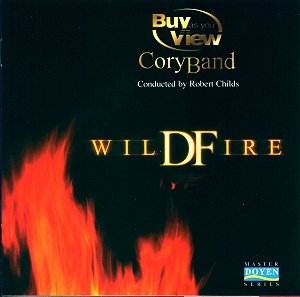In the early 1980s The Cory Band, as they were
simply known then, enjoyed a highly successful period in their
history. This included winning the highly coveted National Brass
Band Championships "hat-trick" for Wales between 1982
and 1984 under the direction of the late Arthur Kenney. Sadly
a number of years in the doldrums were to follow. This was partly
due to a serious fire at their bandroom that saw their library
of music go up in flames as well nearly sending the band completely
under.
It is good, on the evidence of this disc, to
hear that they are back in tremendous and resounding style attracting
well merited once again on the contest stage. Sponsorship of course
makes a major difference and the band have been lucky enough to
land a deal that has obviously made a major difference to them.
Equally it is good to find an adventurous programme
of music packed onto one disc although it should be said that
none of this music falls into the category of avant-garde or out
and out atonality. All too often I have found myself berating
the brass band movement for their reactionary attitudes and lack
of adventure in exploring contemporary music. I say this despite
the assertion in the booklet that brass bands have "an insatiable
appetite for performing new music". Sadly the negativity
of attitudes is still all too prevalent. If you are in any doubt
just consider the furore over the choice of Judith Binghamís Prague
as test-piece for this yearís regional round of qualifying contests
for the National Brass Band Championships. On this level
at least, this disc comes as a real breath of fresh air.
All of the works on the disc have some kind of
connection with the bandís native Wales, albeit some more tenuous
than others. John Pickard lived and worked in Wales for
a number of years (he was a former pupil of William Mathias) and
therefore has one of the closest connections with this thread.
He is the only composer represented by two pieces, both of which
were commissioned by Welsh organisations. Invocation is
a brief, vigorous concert opener, the composerís response to being
asked for a fanfare. A fanfare it is not although it is certainly
an effective and arresting adrenalin rush. Wildfire takes
as its starting point a report in a local newspaper of a Welsh
forest fire that started in two separate locations with the fires
ultimately converging. Although the composer indicates that the
music is not meant to be a programmatic description of the fire
it certainly builds impressively from a quiet beginning through
a number of powerful climaxes to a ferocious conclusion. In terms
of its language I found myself reminded of John McCabe on a number
of occasions, notably Images and Cloudcatcher Fells.
There is also, perhaps, a hint, in the wilder dancing sections,
of Derek Bourgeoisís band pieces. Pickardís writing is challenging
but rewarding and draws an impressive response from the band.
By contrast David Bedfordís Requiem
occupies a more straightforwardly melodic style that will be familiar
to anyone who owns the Doyen recording of his music for wind band
(also reviewed for Musicweb). The piece was written in response
to the composerís feelings of guilt at being frustrated by a traffic
jam that he later discovered had been caused by an accident in
which a young girl had died. The music comes across as strangely
superficial although it is certainly attractive in its melodic
simplicity.
Rodney Newton has had links for a number
of years with the National Youth Brass Band of Wales and wrote
the King of Elflandís Daughter specifically for this recording
following a commission from Robert Childs and the Buy As You View
Cory Band. Taking its inspiration from the fantasy novel of the
same name by Edward Plunkett (Lord Dunsany) it is a majestic,
often lyrical piece that grows organically from the opening mysterious,
mist-shrouded bars. Its sonorous world is well suited to the band
who sound equally majestic in this sonically impressive recording.
Nigel Clarkeís Gwennan Gorn is
an altogether more boisterous affair, a bruising account of the
voyage of the Welsh Prince Madoc to America and his alleged encounter
and ultimate settlement with the Native American tribe of the
Mandans. The sheer power and violence of the opening material
returns to close the piece. It is unmistakably Celtic in flavour,
with a more lyrical central episode incorporating brief references
to authentic Mandan music unearthed by the composer. Anyone who
knows McCabeís Cloudcatcher Fells may just recognise the
(coincidental?) final stabbing three notes!
Geographically at least, Gareth Wood is
perhaps the closest of all these composers to the band, having
been born and bred in South Wales and having spent many years
as a member of the double bass section of the London Symphony
Orchestra. He has produced a significant amount of brass music,
albeit of somewhat variable quality. Salome, written for
the hundredth anniversary of the Parc and Dare Band, is a vivid,
strongly characterised rhapsody based on the biblical story that
had previously inspired Richard Strauss. From the crunching, progressively
more dissonant sounds of the opening depicting the brutality of
Herodís regime, the music passes through comparative tranquillity
in its initial portrait of Salome herself. The tides turn as Salome
shows her true colours culminating in the "Dance of the Seven
Veils" and ultimately Salomeís death.
Doyen have captured the Buy As You View Cory
Band in magnificently full-throated sound, often with sonically
spectacular results. The quality of the playing is rarely less
than thrilling both in terms of the band as a whole and individually
with solo cornet and euphonium both worthy of individual note
(some may remember solo euphonium David Childs as a finalist in
the BBC Young Musician of the Year a few years ago). The result
is a fine release recommended without hesitation.
Christopher Thomas
